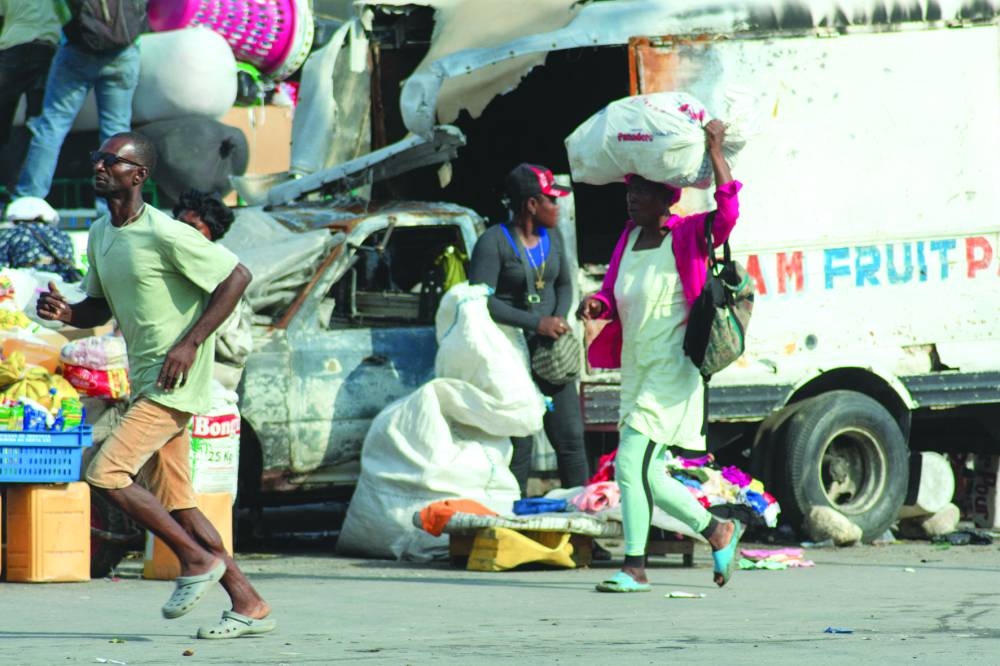A governing council tasked with filling a leadership vacuum in Haiti and restoring a semblance of order was formally established on Friday in the Caribbean nation, which has been rocked by an explosion of gang violence.
A decree in Haiti’s official gazette Le Moniteur announced the council’s formation, a month after Prime Minister Ariel Henry said he would step down amid a wave of attacks by armed gangs in the capital.
The Friday announcement, which had been delayed for weeks by political squabbling, is a hopeful step in efforts to establish conditions for deployment of a UN-approved international police force, which Kenya has agreed to lead.
The decree tasks the council with “rapidly” appointing a new prime minister and a government “inclusive” of Haiti’s various political factions.
Crucially, the formation of the US-backed council is also a first step toward holding a presidential election by early 2026.
However, questions remain over whether the interim government – dubbed a Presidential Transitional Council – will be able to impose its authority over the gangs that control much of Port-au-Prince.
“The Presidential Transition Council exercises specific presidential powers during the transition period until the investiture of the elected President, which must take place no later than February 7, 2026,” the decree on Friday said.
Haiti has not held elections since 2016 and has been without a president since Jovenel Moise was assassinated in 2021.
Henry was in Kenya in February, trying to organise the international police force deployment, when gangs launched a co-ordinated attack and demanded the 74-year-old’s resignation.
Some 4,000 inmates were released in gang raids on Haiti’s two biggest prisons.
Police stations came under assault and attacks on the country’s airport resulted in Haiti being largely cut off from the outside world.
Countries including the United States and EU members evacuated their diplomats and nationals as security conditions worsened.
In fact, after the decree announcing the formation of the Presidential Transitional Council was published, local media reported more gunfire in parts of Port-au-Prince.
An officer, Pierre Fritz Chenet, was shot dead while visiting relatives on the port side of the city, a police union spokesperson said.
Unicef, the UN children’s agency, warned that serious hunger and malnutrition were taking hold in Haiti, which has struggled to recover from a 2010 earthquake which saw an estimated 220,000 people killed.
After intense US and regional pressure, Henry agreed to step aside and facilitate the formation of the transitional council.
He had been Haiti’s unelected leader since 2021, when he was appointed by then-president Moise.
Under the text, Henry will formally resign following the council’s appointment of a new prime minister.
The Caribbean regional body CARICOM, which has played a high-profile role in efforts to create the transitional council, said it “signals the possibility of a new beginning for Haiti”.
The United Nations’ Haiti office said it would “continue to closely follow the Haitian political process”, adding that “international support for Haiti’s national police remains essential for restoring security and the rule of law”.
“These developments represent a positive step toward restoring security, paving the way for free and fair elections, and to re-establishing democracy and inclusive governance in Haiti,” a US State Department spokesperson said on Friday.
The transition council is made up of seven voting members selected across Haiti’s political spectrum and two non-voting observers.
Negotiations to appoint the transition council were marked by infighting and forced the intervention of UN Secretary-General Antonio Guterres, who urged stakeholders to put aside their differences.
Powerful gang leader Jimmy “Barbecue” Cherizier, whose 1,000-member G9 alliance controls parts of Port-au-Prince, was among those excluded from the new government because of conditions banning those facing UN sanctions.
Anyone charged with or convicted of a crime was also blacklisted, along with those planning to take part in the coming elections and anyone who has opposed plans for the international security force.
It remains unknown whether the gangs will agree to step back.
UN sanctions on five of the most powerful crime group leaders have had an “extremely limited” effect, a report from UN experts said.
For Gedeon Jean, director of Haitian rights group CARDH, the establishment of the interim government is an “important step”.
“However, this step is not an end in itself,” he told AFP. “It will be necessary to create the security conditions so that the council can work, but above all to protect the population.”
Camille LeBlanc, a lawyer and former justice minister, said he thought some of the candidates put forward might be rejected and that it could take some time before the council is installed, given the difficulties of processing legal documents.
“It could be very difficult,” LeBlanc told Reuters, adding that while he doubted the council’s prospects, he supported it if it could move the country past the current deadlock, help reopen ports and bring essential food supplies to a country facing acute hunger.
“To declare the transition council must ‘rapidly’ name a prime minister is utopian,” added Port-au-Prince lawyer Camille Fievre.
“Perhaps a time frame ought to have been determined. In the meantime, Mr Ariel Henry remains prime minister,” the lawyer said, adding: “As it stands there is no guarantee the members already chosen will be retained, as no verifications have been carried out in this respect.”
The new authority will also face the immediate challenge of helping ordinary Haitians escape crushing poverty, made more acute by the insecurity.
The United Nations says that out of a population of about 11.6mn, some 360,000 Haitians are internally displaced.
The gang violence, according to UN experts, has forced 95,000 people to flee the capital and pushed five million into “acute hunger”.
As well as targeting police stations and the airport, armed gangs have in recent days looted Haiti’s National Library, two universities and numerous healthcare facilities and pharmacies.

People run after reportedly hearing gunshots in Port-au-Price yesterday.
